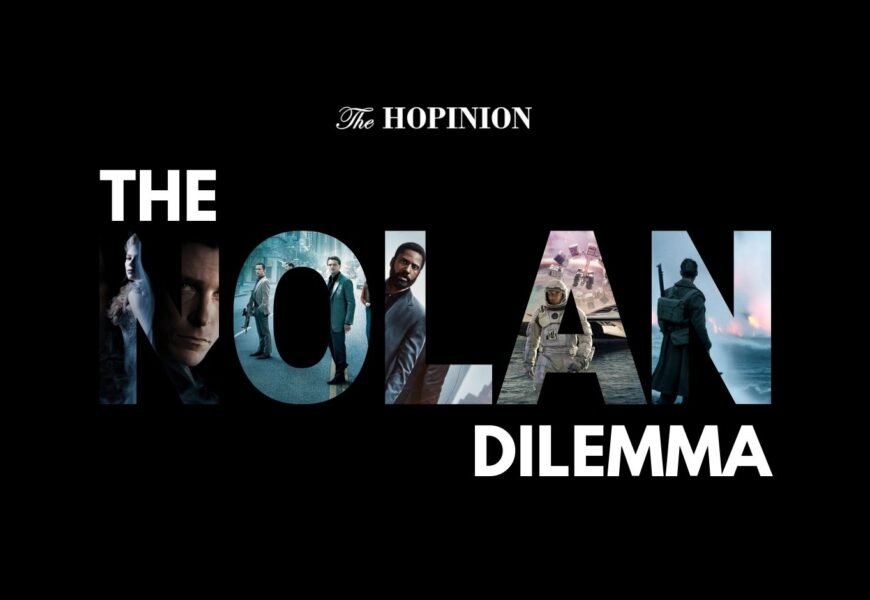There’s a moment—you’ve probably had it—where you’re sitting in a theater watching a Christopher Nolan film and thinking: wait, did I miss something? A sideways glance at a friend. A squint at the screen. Time loops? Dream levels? A protagonist who literally goes backward? What exactly are we watching here?
And maybe that’s the point.
Nolan’s films aren’t just about telling stories—they’re designed as intricate mazes. Sometimes thrilling. Sometimes infuriating. But always deliberate.
Which begs the question: is this mastery… or just a bit much?
Let’s unravel.
The Art of the Maze
Start with Inception. Released in 2010, it made $836 million globally (Box Office Mojo)—not just a blockbuster, but a cultural phenomenon. A film where the architecture of the mind becomes a battleground. Dreams within dreams within dreams. And then that ending: the spinning top. Still debated to this day.
It wasn’t just storytelling; it was structural engineering.
Nolan once told The Guardian, “I think audiences are eager to be challenged.” And frankly, the numbers back him up. The Dark Knight (2008), his moody philosophical take on Batman, became the first superhero film to cross $1 billion at the box office (IMDb). Not because it was colorful and fun—but because it was dark, morally murky, and deeply human.
His fans say he trusts viewers. He doesn’t pander. He constructs. And if you want to follow, fine. But he’s not waiting up.
The Domino Effect
It’s not just Nolan riding this wave. Filmmakers like Denis Villeneuve (Arrival, Dune) and Alex Garland (Annihilation, Ex Machina) have leaned into layered, cerebral narratives. Films that don’t just entertain—they haunt, challenge, linger.
Roger Ebert once said, “Nolan’s films are not just watched; they are dissected, discussed, and debated.” There’s a kind of post-viewing ritual now: YouTube breakdowns, fan theories, philosophical forums. You don’t just leave the theater—you enter another layer.
But…
When Complexity Becomes a Cage
Let’s talk Tenet. A film about time inversion, global stakes, and—honestly—dialogue so muffled and plotlines so tangled that entire Reddit threads emerged just to explain basic scenes.
Its box office? Disappointing. $363 million worldwide on a $200 million budget (The Numbers, 2020). For a Nolan movie, that stung.
And the criticism? Consistent. Confusing, cold, cerebral to a fault. Richard Roeper captured the mood: “Sometimes [his] films feel like a math problem disguised as a movie.”
Even Interstellar, with its emotional heartbeat and jaw-dropping visuals, couldn’t escape critique. Some found it too sentimental. Others thought it tried to explain too much—and not enough—all at once.
The risk of this high-concept style is simple: alienation. When viewers need a Ph.D. in physics—or subtitles for English—to get through a film, something’s off.
There’s a fine line between depth and detachment.
Nolan at His Best? Maybe It’s When He Balances Both.
The Prestige (2006). A film about illusion, obsession, and the costs of greatness. Twisty, yes, but also grounded. You could follow it—and still be surprised. A.O. Scott said it best: “The Prestige is a film that rewards multiple viewings, not because it’s confusing, but because it’s rich.”
Or take Dunkirk (2017). A war film told across three timelines that collapse into one. The story isn’t hard to follow, but it’s elevated by its structure. Innovation used to amplify emotion—not obscure it. It grossed over $526 million and won three Oscars (Box Office Mojo, 2017).
That’s Nolan with restraint. Controlled chaos. A puzzle, but with a key—if you’re paying attention.
So… What Are We Really Watching For?
Maybe the bigger question isn’t whether Nolan is too complicated. Maybe it’s: what do we want from a movie?
Something to feel? Something to think about? Or something that leaves us sitting in silence when the credits roll, wondering what the hell just happened—and somehow, wanting to go through it again?
Films don’t need to be easy. But they also don’t need to feel like homework. And Nolan, for better or worse, walks that tightrope like no one else.
Artistry or overcomplication?
Depends, I guess. On your patience. On your mood. On whether you see film as entertainment or a kind of intellectual sport.
Either way, it’s clear: Nolan isn’t going to change. He’s building castles of thought and time, and we’re either following him inside—or standing outside, shaking our heads.
But one thing’s for sure.
In an era of formulaic blockbusters and algorithm-driven content, Nolan dares to be… difficult.
And maybe that, in itself, is worth watching.
—
Citations:
- Box Office Mojo. (2010). Inception.
- IMDb. (2008). The Dark Knight.
- The Numbers. (2020). Tenet.
- Box Office Mojo. (2017). Dunkirk.
- The Guardian. Interview with Christopher Nolan.
- Roger Ebert. Review of Inception.
- Richard Roeper. Review of Tenet.
- A.O. Scott. Review of The Prestige.














